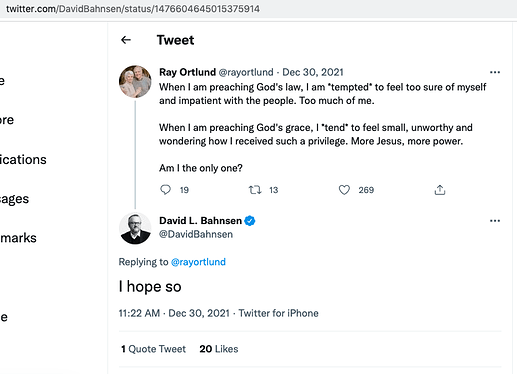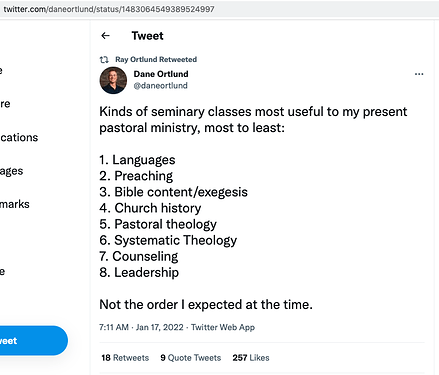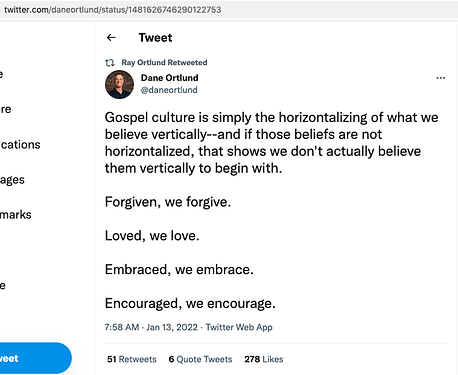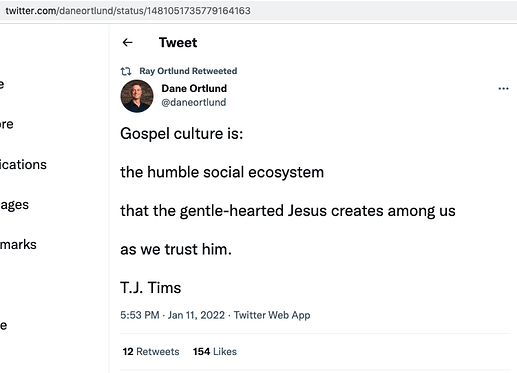New Warhorn Media post by Tim Bayly:
Got this book a while back and started through it with my wife. I thought it would help me grow in areas where I’m weak (comfort and tenderness). But as we read each chapter a conflict arose inside of me. Either I’m way off in my understanding of God’s character, love, grace, mercy, etc., or this book is. About half way through I couldn’t take it anymore and we haven’t returned to it.
There were some helpful things in the book but it was tough work straining it out of all of the cheap grace that doesn’t heal our wounds. I wouldn’t recommend this book to those that it’s supposed to help. I’d warn against it instead. Thanks for showing me that I wasn’t alone in my assessment.
We should recognize how ubiquitous this book is across the Reformed world right now. I’m sure that’s why Tim was compelled to comment on it so strongly. It is and will be having an impact and shepherds should be mindful of it.
Not only has it been a runaway best-seller for Crossway, but in early 2021, a wealthy donor gave Crossway the funds to have churches signup to receive up to 208 free copies of the book PROVIDED they promised to use the book as a congregation in some form. I have no idea how many churches availed themselves of that offer but that’s how I ended up with a free copy. I haven’t read it and haven’t wanted to because it felt like a Christological version of this empathic, therapeutic Christianity that is being promoted at the upper levels of the evangelical establishment these days. Many tell me it is good and helpful but I have remained skeptical, although I have struggled to articulate my skepticism.
According to Reformed Baptist pastor Jeremy Walker (who I know and trust), Ortlund is not all wrong in his book but does bring several cases of unfortunate twisting to the old Puritan sources he is drawing from. As Tim has already said elsewhere, its probably best to let Richard Sibbes, Thomas Goodwin, and John Bunyan speak for themselves rather than getting Ortlund’s summary of Bunyan, Goodwin, and Sibbes.
The devotional classics The Bruised Reed (Richard Sibbes, 1630), The Heart of Christ in Heaven for Sinners on Earth (Thomas Goodwin, 1651) , Come and Welcome to Jesus Christ (John Bunyan, 1681), and All Loves Excelling: The Saint’s Knowledge of Christ’s Love (John Bunyan, 1692) have stood the test of time and been made available by Banner of Truth for future generations to easily track down and read (I noticed in posting the links that a couple of them are currently out of print but I would expect that to be short-lived with these Puritan Paperback titles—hopefully the Ortlund book has caused some to seek out the original sources).
Jeremy Walker says in his review:
Lost sinners need to be confident that a saving Christ will receive them with infinite readiness and tenderness. Christians need to know Christ’s disposition of love toward us, and to feel it, and to understand the ways in which it is manifested toward us. Because of my delight in the topic, I wanted to love this book, and at points I did. Nevertheless, I too often felt I needed subtly, internally, to rework a phrase, to introduce a nuance, to press further a point, or to adjust an assertion. […] I think there is a danger that it might not so much correct certain imbalances as introduce different ones.
If that’s what a seasoned pastor believes is necessary while reading Ortlund than what of the flock who may not see the subtle twists or imbalances that are being introduced? All the more reason to steer clear.
You have raised a good warning for us, Tim, and I thank you for doing so.
There’s often a certain faddishness to books. This devotional or that Advent book or such an such a theology treatise. Books come and go. Give it five years and no one will be talking about G&L. But I’ve been genuinely surprised by how many people seem to be falling all over themselves to commend this book. And from authors/pastors/theologians who know the Puritans well. Is any book really worth so much hype and so little critical engagement?
That’s the issue. Very well stated.
I’ve felt this way about a lot of Crossways ‘big’ books lately. Not that they’re totally untrue, but from my (limited) perspective, they’re not what most Christians I see need. Reformish Christianity is so saturated with justification alone and cheap grace that any discussion of the law of Christ and the need for growing in sanctification is automatically discounted as legalistic.
Sibbes, Goodwin, and Bunyan knew better.
I agree with Dave, above. Here in ascending order of importance are:
The good: makes you want to read Goodwin, Edwards, Bunyan et al on assurance. Quotes them at length.
The bad and the ugly: his preciousness; his carelessness; his failure to ground Christ’s gentleness biblically; his spoiling of what he gives you from Goodwin and Edwards because of the other bad/ugly stuff. No one needs to hear garbage like:
“[Jesus’] desire to draw near to sinner and sufferers is not only doctrinally true but aesthetically attractive” (101).
Last and most important, the blasphemous:
“And if the actions of Jesus are reflective of who he most deeply is, we cannot avoid the conclusion that it is the very fallenness which he came to undo that is most irresistibly attractive to him” (30).
It’s mind-boggling to me that I couldn’t find a peep online about this sentence, even from those who didn’t like the book. I think it’s the most significant sentence in the book. Yeah, I know he didn’t “mean” to blaspheme. But his preciousness and carelessness—which is to say his lack of reverent fear of God—led him into evil. And no one reading the book ahead of time had sense or fear of God enough to warn him against leaving this sentence in, either. This is a book to warn against.
I’m glad I wasn’t the only one annoyed with this book (and the way it’s being promoted).
I only read it because my SIL was so annoyed with it (they used it church-wide in small groups… probably “free”) that she bought me a copy.
I read a review of this book on Doug’s blog and he recommended it, though he said it did at time suffer from being overly emotive — something he said the puritans could be prone to. I started reading it and right off the bat Ortlund makes all kinds of assertions about Jesus’ highest aim/desires — the kind that Ben mentioned. This kind of speculative talk turned me off. Thanks for the thread.
Which of the Puritan original sources would you all find most helpful if you had to pick one? I’ve heard good things about Sibbes.
Sad that Doug recommended it, bit then it is a Big Eva best seller.
Ben has spoken well about what is most to be condemned in Ortlund’s treacle. Pay heed to him.
What was most noticeable to me right out of the gate was Ortlund’s repetition of the statement Ben quotes, incidentally, that meek and gentle is “who Jesus most deeply is.” Ortlund never stops saying this.
That Doug and everyone else don’t bother to expose this denial of God’s perfections indicates how much they fear departing from Big Eva’s conversation. Our Lord’s perfections are more gentle than just? More lowly than lordly? This kind of false antithesis is rife within Big Eva. Note Ortlund’s allusion to the heart of Jesus vs. the God of the Old Testament.
His errors could not be more obvious.
As far as which Puritan to read on assurance, anything at all would be better than Ortlund. But start with the careful words of our Westminster Standards:
-
Although hypocrites and other unregenerate men may vainly deceive themselves with false hopes and carnal presumptions of being in the favour of God, and estate of salvation (Job 8:13–14, Micah 3:11, Deut. 29:19, John 8:41) (which hope of theirs shall perish): (Matt. 7:22–23) yet such as truly believe in the Lord Jesus, and love Him in sincerity, endeavouring to walk in all good conscience before Him, may, in this life, be certainly assured that they are in the state of grace, (1 John 2:3, 1 John 3:14,18–19,21,24, 1 John 5:13) and may rejoice in the hope of the glory of God, which hope shall never make them ashamed. (Rom. 5:2,5)
-
This certainty is not a bare conjectural and probable persuasion grounded upon a fallible hope; (Heb. 6:11, 19) but an infallible assurance of faith founded upon the divine truth of the promises of salvation, (Heb. 6:17–18) the inward evidence of those graces unto which these promises are made, (2 Pet. 1:4–5, 10–11, 1 John 2:3. 1 John 3:14, 2 Cor. 1:12) the testimony of the Spirit of adoption witnessing with our spirits that we are the children of God, (Rom. 8:15–16) which Spirit is the earnest of our inheritance, whereby we are sealed to the day of redemption. (Eph. 1:13–14, Eph. 4:30, 2 Cor. 1:21–22)
-
This infallible assurance doth not so belong to the essence of faith, but that a true believer may wait long, and conflict with many difficulties, before he be partaker of it: (1 John 5:13, Isa. 50:10, Mark 9:24, Ps. 88, Ps. 77:1–12) yet, being enabled by the Spirit to know the things which are freely given him of God, he may, without extraordinary revelation in the right use of ordinary means, attain thereunto. (1 Cor. 2:12, 1 John 4:13, Heb. 6:11–12, Eph. 3:17) And therefore it is the duty of every one to give all diligence to make his calling and election sure, (2 Pet. 1:10) that thereby his heart may be enlarged in peace and joy in the Holy Ghost, in love and thankfulness to God, and in strength and cheerfulness in the duties of obedience, (Rom. 5:1–2, 5, Rom. 14:17, Rom. 15:13, Eph. 1:3–4, Ps. 4:6–7, Ps. 119:32) the proper fruits of this assurance; so far is it from inclining men to looseness. (1 John 2:1–2, Rom. 6:1–2, Tit. 2:11–12, 14, 2 Cor. 7:1, Rom. 8:1, 12, 1 John 3:2–3, Ps. 130:4, 1 John 1:6–7)
-
True believers may have the assurance of their salvation divers ways shaken, diminished, and intermitted; as, by negligence in preserving of it, by falling into some special sin which woundeth the conscience and grieveth the Spirit; by some sudden or vehement temptation, by God’s withdrawing the light of His countenance, and suffering even such as fear Him to walk in darkness and to have no light: (Cant. 5:2, 3, 6, Ps. 51:8, 12, 14, Eph. 4:30, 31, Ps. 77:1–10, Matt. 26:69–72, Ps. 31:22, Ps. 88, Isa. 50:10) yet are they never utterly destitute of that seed of God, and life of faith, that love of Christ and the brethren, that sincerity of heart, and conscience of duty, out of which, by the operation of the Spirit, this assurance may, in due time, be revived; (1 John 3:9, Luke 22:32, Job 13:15, Ps. 73:15, Ps. 51:8, 12, Isa. 50:10) and be the which, in the mean time, they are supported from utter despair. (Micah 7:7–9, Jer. 32:40, Isa. 54:7–10, Ps. 22:1, Ps. 88)
Anything written by a Puritan is going to sound these notes above rather than the cotton candy Ortlund is selling. Love,
Sibbes’ Bruised Reed is an excellent intro to Puritan theology that is accessible at a devotional level. My wife, a godly woman but not someone who geeks out over the Puritans, loves The Bruised Reed. There’s also an audio of part or all of the sermon somewhere. Goodwin’s Heart of Christ is also fantastic. Neither is as twee as Ortlund’s summary of their works nor as truncated as his theology. They offer the comfort of Christ along with brilliant calls to repentance and faith in Christ. And both books cost less than the price of a pint of beer!
A friend sent me this Ray Ortlund tweet and the David Bahnsen response and it felt significant for this thread so I thought I would post it here.
Additionally, while I was scrolling to through Ray Ortlund’s Twitter feed to find the original tweet, I found several other tweets that seemed relevant to the discussion in this thread (some tweets are by Ray, some are retweeted from Dane). They all seemed highly illustrative of the “preciousness and carelessness” @bstormcrow highlighted above.
Is it bad that I don’t really understand what either Pastor Ortlund is actually saying in any of those tweets? They just seem to be emotional and holy-sounding gobbledygook.
Isn’t that the biochemist’s specialty, gobbledygook?
Shhh. Don’t go telling our secrets to everyone.
This one tells you everything about him as a pastor. Notice, he says it is useful for “pastoral ministry.” Not book writing, not teaching…
His top pick for pastoral help? Greek and Hebrew. Ah yes, I have often found the finer points of Greek and Hebrew useful for counseling sin, grief, and joy.
Maybe he’s critiquing the awful pastoral theology, counseling, and leadership courses at his seminary? (Insert sarcasm emoji)
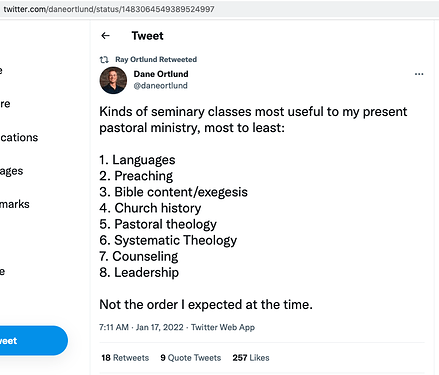
I didn’t take his tweet as a direct indictment of the type of training he received so much as the areas from his training he reaches back for most frequently now.
It would be interesting if he were critiquing the pastoral theology and counseling training he received at Covenant Theological (2002—2007) since the school boasts about how well it does in this respect (or, at least many of the men to come from the school boast about this being a strength of CTS).
While looking up Dane Ortlund’s bio above, I stumbled across this worthless article from the exceedingly contemptible Relevant Magazine complaining about the criticism Dane Ortlund’s book had received from Grace To You: “The Controversy Behind Dane Ortlund’s ‘Gentle and Lowly’ Explained” (Relevant Magazine, March 16, 2021).
The tell is this quote:
The fact that Ortlund’s characterization of Jesus run afoul of a certain kind of Reformed Christian understanding of Jesus is probably no surprise, but it did set off a lot of conversation among many people who found the review uncharitable.
I mention this article to highlight the kind of offense that will be taken toward any criticism of this book or similar works. Notice that this isn’t just a “certain kind of Reformed Christian” (as if the problem is merely one of a critic’s attitude) but the problem is a “certain kind of Reformed Christian understanding of Jesus.” This gets at a point of doctrine and emphasis.
But what does Relevant Magazine dislike in the criticism? They give us a quote from GTY reviewer Jeremiah Johnson, held up as a representative sample of the uncharitable criticism:
“Ortlund seems convinced that most evangelicals in the current generation have a perception of Christ’s character that isn’t mild enough,” Johnson writes. “As if too much fear of the Lord is what has made postmodern evangelicalism so dysfunctional.”
Relevant scoffs at this idea. They offer no critique or counter—only their contempt. They announce that the review gets “increasingly hostile” and proceed to give a play-by-play of the grievances before giving us some choice Twitter rebukes. (The GTY review has apparently been deleted by GTY and I’m having trouble finding it on the Wayback Machine as well.)
Now, to my knowledge, the people warning against Gentle and Lowly (and the therapeutic presentations of Jesus common in our day) are not saying Jesus does not love, care for, or reach out to sinners. Indeed, we agree with the psalmist:
“The Lord is merciful and gracious, slow to anger and abounding in steadfast love.” (Psalm 103:8)
We rejoice as children of a gracious King:
"As a father shows compassion to his children, so the Lord shows compassion to those who fear him. For he knows our frame; he remembers that we are dust. (Psalm 103:13–14)
We know and cling to Christ’s words in Matthew 11:28–30 as words of life:
Come to me, all who labor and are heavy laden, and I will give you rest. Take my yoke upon you, and learn from me, for I am gentle and lowly in heart, and you will find rest for your souls. For my yoke is easy, and my burden is light.
But we also warn against downplaying the fear of the Lord in an age of mass therapy—an age that is quick to find Jesus empathizing with us, justifying who we envision ourselves to be. People resist the sharp words of rebuke and the need to be roused from slumber. Have we forgotten that the encouragement of Hebrews 4:15 (Christ sympathizing with our weakness) comes after the careful and sharp exposition of the exhortation from Psalm 95:
“Today, if you hear his voice, do not harden your hearts.”
Why give such a warning? The writer of Hebrews tells us:
Therefore, while the promise of entering his rest still stands, let us fear lest any of you should seem to have failed to reach it. For good news came to us just as to them, but the message they heard did not benefit them, because they were not united by faith with those who listened. (Hebrews 4:1–2)
This strong word of rebuke and warning was given for our good. But there’s that awful word: fear. This is something modern psychologists are here to help us overcome because fear is bad. It is a hinderance to our personal well-being and self-image. It leads to stigma and shame.
In the 2009 guide for psychologists entitled Appropriate Therapeutic Responses to Sexual Orientation, the American Psychological Association described what it pictured as “ideal affirmative care” for LGBTQ clients:
The empathic therapeutic environment aspires to be a place of compassionate caring and respect that facilitates development by exploring issues without criticism or condemnation and by reducing distress caused by isolation, stigma, and shame. (p 55)
Does this vision sound familiar? This is a secular group describing secular therapy yet it sounds strikingly like something we hear all the time in Christian circles these days. In fact, it sounds like Dane Ortlund’s vision of “gospel culture”:
Gospel culture is simply the horizontalizing of what we believe vertically—and if those beliefs are not horizontalized, that shows we don’t actually believe them vertically to begin with.
Forgiven, we forgive.
Loved, we love.
Embraced, we embrace.
Encouraged, we encourage.
Although the therapeutic vision of the APA is not directly stated here, it still seems that pastors are expected to be “spiritual psychologists” and the members are supposed to cultivate this “gospel culture” that is only and all forgiveness, love, embracing, and encouragement. We notice many words absent from this list and I doubt it has anything to do with Twitter’s character limit. Ortlund has surely chosen his examples carefully.
But we also see that if we are not “forgiving” and “loving” and “embracing” and “encouraging” in the way Ortlund and those who follow him consider proper, it is because “we don’t actually believe [these ideas] vertically to begin with.” Perhaps he sees this as putting our very faith in Christ in jeopardy, but such would seem a harsh judgment for someone so gentle and gracious. But the real interest here is not so much our beliefs of or about God but our cultivation of a particular atmosphere—this “gospel culture.” It is supposed that this is the grand ideal.
And it is a culture that assumes we all share in the truth and there are no wolves or deceptions or false hopes—only a failure to fully believe the best parts of the good news.
No one is as harsh and legalistic as the one who believes in Only Grace.
Some of the harshest conversations I’ve received have been from Christians who have bought into Only Grace. In the US and the UK.
An error in the Relevant magazine review; the GTY reviewer was Phil Johnson, not Jeremiah Johnson. The Jeremiah Johnson I think that Relevant was referring to, is someone associated with the Charismatic scene. I went looking for the GTY article as well, couldn’t find it, and I’m surprised they took it down.
What’s funny is I’d never heard of the book until after condemning it. It’s also funny Phil pulled his review. Obviously, criticizing Dane and Crossway’s soporific nonsense is dangerous to those wanting to keep their place at feast. Your postings here, M.D., continue to be helpful. Thank you. And yes, Aaron, my Dad used to say no one’s more intolerant than a liberal and you point out the corollary that no one’s more graceless than the grace-alone. Love,

